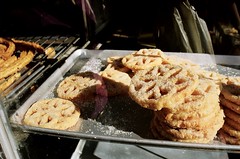After taking a look at the Lifelong Learning lesson posted the 16th of December, I must say I really appreciate this collection of websites encouraging learning on the internet.
Currently, I am working on an application to the Master's programme in Anthropology of Food at the School of Oriental and African Studies, University of London. I anticipate to send off the online portion of the application by the end of this week or early next week, and am looking forward to attending the school in the fall, provided I'm accepted.
In the meantime, books and DVDs from our wonderful library have provided me with plenty of mental stimulation since graduating from Rollins in 2007. In addition to what I check out, I also rely on various websites and websites for further news and knowledge. For current events, I go to the BBC and NPR, which is also a wonderful source for new music (seriously) and books. For food edification, I've been checking out Martha Stewart.com for recipes and Serious Eats, an online food community and blog. With regards to world views on affairs, business and culture, I rely on Monocle for its weekly podcast, online videos and its print magazine.
With regards to the websites listed in the lesson, I love, love, love Wikipedia, but was surprised to see Wikiversity. I like the idea, and the execution seems to be done well. I took a peek at the History portal, and felt the links were well-organised. One thing I noticed was the call for assistance in compiling ideas and knowledge on topics, such as World War I. I imagine Wikiversity would be useful to gain some knowledge on a topic, provided there is a page for it. I typed in a few topics wandering in my head, "history of Prague," for example, but there were no pages for them. It appears Wikiversity has some catching up to do in order to be as well-known as its sister site, but perhaps this will come in time as more people contribute.
In looking up "Prague" on Connexions, I was greeted with a range of links not quite hitting on what I wanted. After refining my search to "history of Prague," it seems the only articles available are historical pieces covering the whole of Europe in segments of time. Within these articles, it is possible to find text of relevance, such as in the Europe: AD 1401 to 1500 page where I learnt the origins of the Bohemian Revolution. Sadly, when searching for information on "Bohemian Revolution" in Connexions, I just got more articles along the "Europe: time period" format. Still, within the web, knowledge abounds, and if you want to know more about the Bohemian Revolution/Wars, more commonly known as the Hussite Wars, Wikipedia saves the day.
As someone who is a (very) amateur photographer, I appreciate the Nikon link (although I'm a Canon girl myself). I think it's very helpful to have some commonly asked questions addressed in a helpful, step-by-step manner. Huzzah!
The website eXtopia seems like it could be helpful, but who said mustard and red should be used together to create an info box?! Their Intro to Web Design course needs to have a segment on using complimentary colours, which their current colour section lacks. Just because you can use "peru" and "crimson" together doesn't mean you should. Perhaps the website creators could use a lesson in colour theory. Still, aside from the abominable colour choices, it's something worth exploring deeper for information that may be helpful.
And with regards to the Adventure activity for this lesson, I've ordered pizza from Papa John's before online, so that's done. I prefer local restaurants, though.
Wednesday, February 4, 2009
Online learning, more or less
Labels:
connexions,
extropia,
Learn 2.1,
photo lessons,
wikipedia,
wikiversity
Subscribe to:
Post Comments (Atom)

1 comment:
I am looking forward to your Master's Thesis - The Origins of the Cupcake!!!
Post a Comment